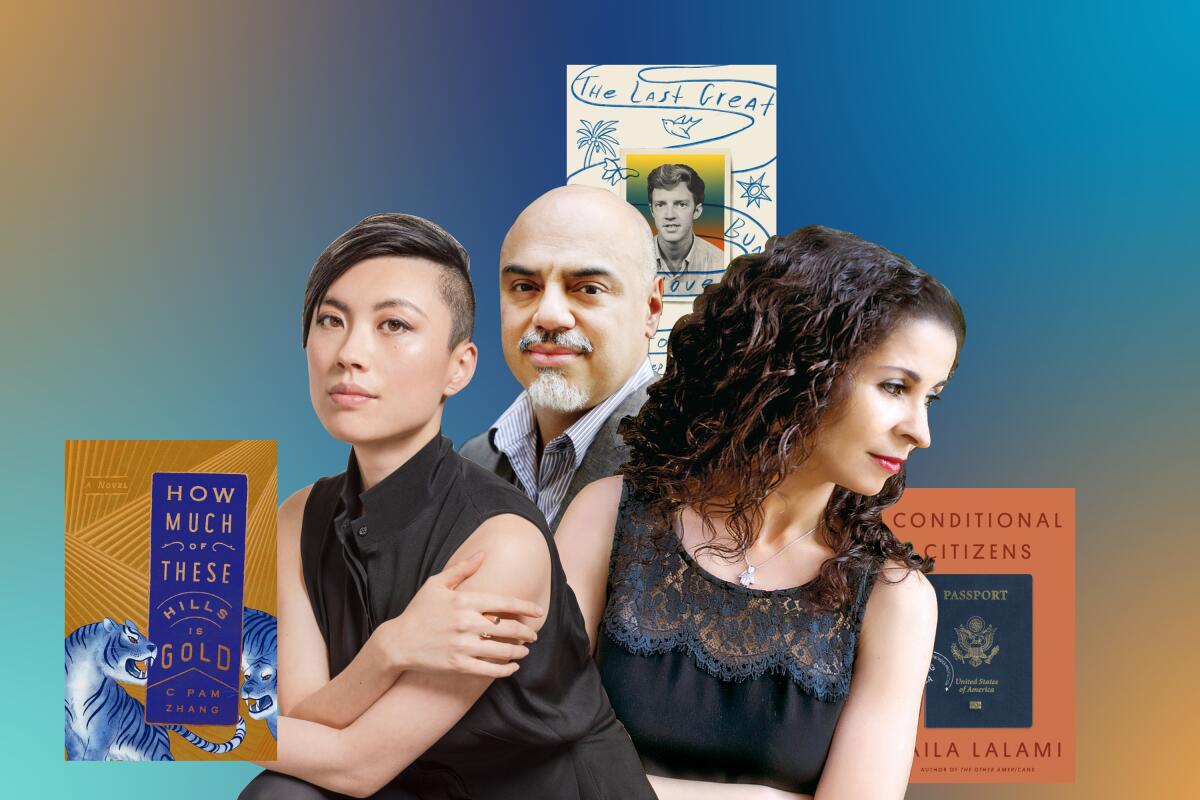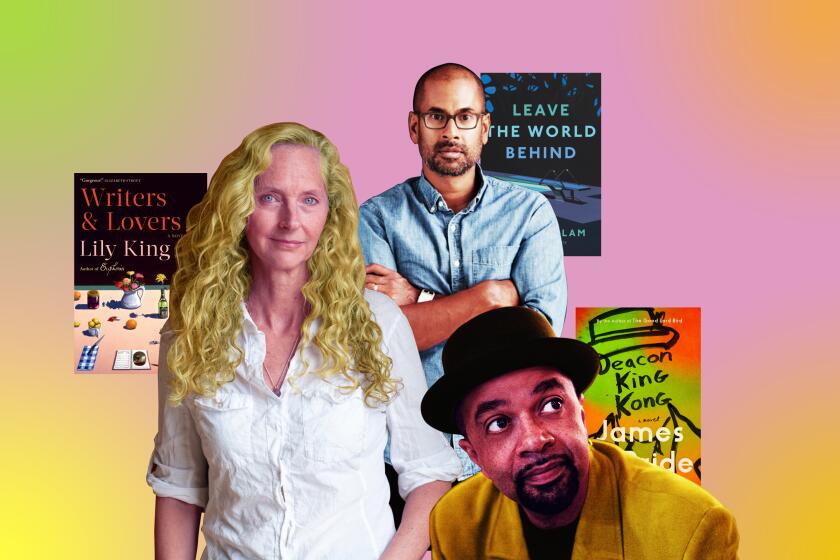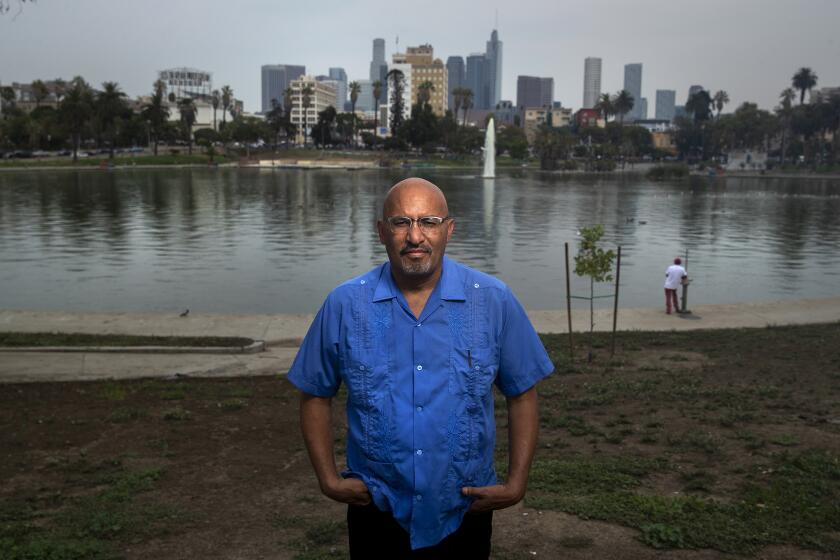The 10 best California books of 2020

- Share via
On the Shelf
The Best California Books of 2020
If you buy books linked on our site, The Times may earn a commission from Bookshop.org, whose fees support independent bookstores.
These last several months, as we quarantined and went into shutdown mode, I found myself missing California in the most visceral sense. I know it’s there — I can see it, right outside my window — but I long for the moment when I will once again be able to move freely through it, to immerse myself in its breadth and depth. Perhaps that’s why I spent so much of 2020 reading literature from or about the state. For all the horrors of this year, it has been a great one for California writing. Here are 10 favorite books that have changed or expanded the ways I think about this place.
The very best of the year, from authors including Natasha Trethewey, Rumaan Alam, Lily King, Douglas Stuart, Raven Leilani and James McBride.
Conditional Citizens: On Belonging in America
By Laila Lalami
Pantheon: 208 pages, $26
Best known as a novelist, Lalami is also an acute and pointed essayist. Her first collection highlights the divisions and dislocations of immigrant communities in the age of Trump. Moving fluidly between the personal and the collective, this is political writing at its most effective, grounded in the author’s experience but turned outward, to the inequities (and worse) many Americans face as a matter of course.
East of East: The Making of Greater El Monte
Edited by Romeo Guzmán, Caribbean Fragoza, Alex Sayf Cummings and Ryan Reft
Rutgers University Press: 362 pages, $35
Featuring 32 essays by writers including Alex Espinoza, Salvador Plascencia and Fragoza, this anthology seeks to restore the “silenced histories” of El Monte, the small working-class city in eastern Los Angeles County, while also re-imagining its future as a community in its own right. “The future will not happen in the cities or the suburbs,” the editors write, “but in the middle, and El Monte and South El Monte have always been in the middle.”
A Handful of Earth, A Handful of Sky: The World of Octavia E. Butler
By Lynell George
Angel City Press: 176 pages, $30
George’s tribute is less a biography than an extended conversation between herself and Butler, the MacArthur-winning science fiction writer (and longtime Pasadena resident) who died in 2006 at age 58. Using Butler’s papers at the Huntington Library as a starting point, George delves into questions of identity and creativity, affirming in the process that reading and writing are, at heart, collaborative enterprises.
How Much of These Hills Is Gold
By C Pam Zhang
Riverhead: 288 pages, $26
This delightful debut novel, set during the Gold Rush, involves two Chinese siblings, Lucy and Sam, left to fend for themselves after their father’s death. Zhang deftly interweaves history with a magical realist sensibility to reclaim a place for Asian Americans in the narratives of the American West.
The Last Great Road Bum
By Héctor Tobar
MCD: 416 pages, $28
Tobar’s novel is a departure, and an innovation: the story of Joe Sanderson, a Midwesterner who ended up dying in El Salvador after joining the rebel forces in the country’s civil war. Blurring fiction and nonfiction — Sanderson was a real person, whose journals and other writings Tobar used as source material — the book asks trenchant questions about imagination, appropriation and where, or whether, we belong.
The journalist talks about his new book, “The Last Great Road Bum,” which draws on the diary of Midwesterner Joe Sanderson, killed in El Salvador.
Passage West
By Rishi Reddi
Ecco: 448 pages, $29
Reddi’s second work of fiction does something I wouldn’t have thought possible, telling a California story from the inside even though the author lives in Massachusetts. Reddi, though, is a novelist of capacious imagination, and in this saga of South Asian agricultural workers in the Imperial Valley during the early 20th century, she has recovered an overlooked piece of history and brought it to vibrant life.
Recollections of My Nonexistence
By Rebecca Solnit
Viking, 256 pages, $26
Solnit begins this book of personal and cultural explorations with the memory of looking in a mirror and seeing herself disappear. It’s a fitting metaphor for a narrative that is as much a social history as it is a memoir, engaging questions of invisibility and silence and the way patriarchal forces seek to render women small.
Set the Night on Fire: L.A. in the Sixties
By Mike Davis and Jon Wiener
Verso: 800 pages, $35
This comprehensive history represents a corrective to the idea that 1960s West Coast activism was confined to Northern California as well as a rebuke to readings of radicalism through a dominant white lens. Davis (author of the transformative L.A. exegesis “City of Quartz”) and UC Irvine emeritus professor Wiener frame the city as a complex amalgam of communities and agendas — home to Black Power and the Chicano Moratorium as well as gay rights and other liberation movements. Essential and long overdue.
In “Set the Night on Fire: L.A. in the Sixties,” Mike Davis and Jon Wiener track the uprisings, outrages and elections that shaped the city.
Summer Snow
By Robert Hass
Ecco: 192 pages, $28
A former United States poet laureate and recipient of a Pulitzer Prize, Hass has long been a signature California writer, one who often uses the natural world as a lens, especially the landscapes of his native Northern California. These latest poems keep circling the notion of remembrance — of place, of those who are gone, of the poet’s past. The mood, however, is not so much somber as it is accepting, and the language is a revelation, clear and sharp.
Unforgetting: A Memoir of Family, Migration, Gangs, and Revolution in the Americas
By Roberto Lovato
Harper: 352 pages, $27
Lovato’s memoir offers a relentless evocation of family and displacement played out between California and El Salvador. Raised in San Francisco, the poet and activist reflects on his own life and his father’s, weaving both into a larger narrative about political influence and violence and the intersection of private and public lives.
In “Unforgetting: A Memoir of Family, Migration, Gangs, and Revolution in the Americas,” Roberto Lovato finally tells the full story of his rebel life.
Ulin is the former book editor and book critic of The Times.
More to Read
Sign up for our Book Club newsletter
Get the latest news, events and more from the Los Angeles Times Book Club, and help us get L.A. reading and talking.
You may occasionally receive promotional content from the Los Angeles Times.







